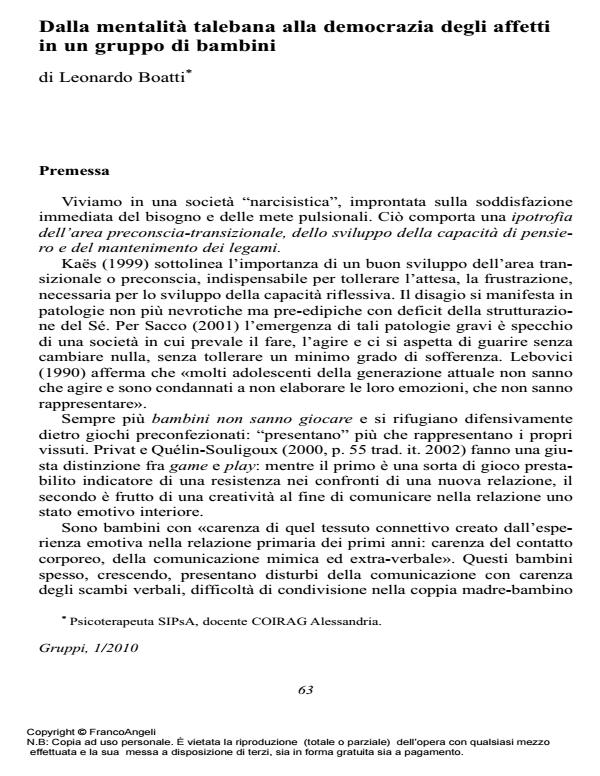From the Taliban mentality to a democracy of affections in a children’s group
Journal title GRUPPI
Author/s Leonardo Boatti
Publishing Year 2010 Issue 2010/1 Language Italian
Pages 11 P. 63-73 File size 427 KB
DOI 10.3280/GRU2010-001006
DOI is like a bar code for intellectual property: to have more infomation
click here
Below, you can see the article first page
If you want to buy this article in PDF format, you can do it, following the instructions to buy download credits

FrancoAngeli is member of Publishers International Linking Association, Inc (PILA), a not-for-profit association which run the CrossRef service enabling links to and from online scholarly content.
In the past few years, analytic psychotherapy of the developmental age is in a phase of deep renewal from a methodological and operational point of view. We live in a "narcissistic" society that is based on the immediate satisfaction of needs and pulsions. It involves hypotrophy in the preconscious-transitional area of development of thinking capacity and preservation of relationships. Kaës underlines the importance of a good development of the transitional or preconscious area, which is essential to be able to tolerate the waiting and frustration that are useful for developing reflective ability. Lebovici asserts that «Many teenagers of the new generation can only act, and they are doomed not to elaborate their emotions, which they do not know how to represent». In parallel, more and more children do not know how to play: they "present" but do not "represent" their experiences. Therapists of the developmental age find themselves facing children’s groups that communicate their emotions primarily in a sensory and bodily manner. The conservational capacity of thinking is thus lost. The therapist’s tiring work consists in remaining in Bion’s K- condition and in translating the affective and emotional communication expressed by the senses and the body into words and thoughts through representations and games (play), which express what is happening in the group at that moment. Through time, this allows for the creation of a preconscious pellicle (Bion’s contact pellicle) which "much like a cell membrane" favors a direct exchange between the inside and outside, between the conscious and unconscious. In this abstract, the clinical exemplification deals with a children’s group whose composition has changed, and this has determined a violent clash between the representatives of the two ways of communicating affection. In particular, two newcomers to the group "two girls" make a difficult, painful structural and mental change in the group: from a Taliban mentality there is a shift to a democratic mentality of affection. There is a conflict between a masculine archetype, which is based on action and games as an expression of one’s emotions, and a feminine archetype, which is based on words and thought.
Keywords: Transitional area, sensory impressions, Taliban mentality, democracy of affections, masculine, feminine.
Leonardo Boatti, Dalla mentalità talebana alla democrazia degli affetti in un gruppo di bambini in "GRUPPI" 1/2010, pp 63-73, DOI: 10.3280/GRU2010-001006